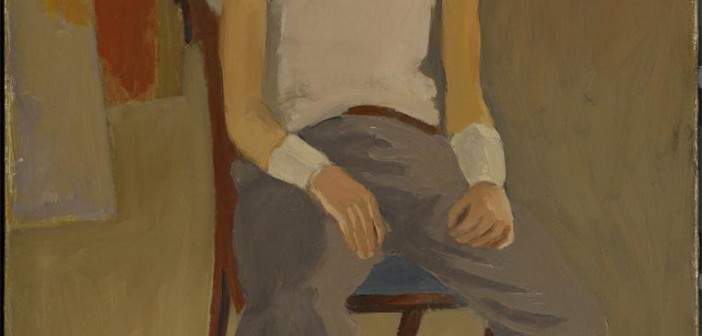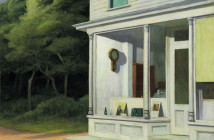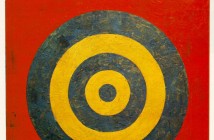"Poïesis is etymologically derived from the ancient Greek term ποιέω, which means "to make". This word, the root of our modern "poetry", was first a verb, an action that transforms and continues the world. Neither technical production nor creation in the romantic sense, poietic work reconciles thought with matter and time, and man with the world." (Wikipedia)
PORTRAIT OF LARRY RIVERS (WITH WRIST BANDAGES)
- After Fairfield Porter, 1951
The day is one of Larry’s images where half the page is line
and the other looms and spreads. This sunshine state of mind,
blinded by the blast of heat, or the circumstance of light
so liquefied as it lands in spots on ground
that the only source of truth you can rely on in this life
shimmers against the grass on an abbreviated
picnic scene in the early paintings of Claude Monet.
But I mean a new contemporary, one that allows
for oil stick in slashes, each axe-handled equation
an attempt to destroy surfaces, resurrect those things
behind the fabric, the brick, the shadows, and all
of their arrivals. I mean repetition, as each search
for Mr. Rivers protected in those large wrist bandages,
those adhesives as high-key of color
in an extraordinary winter, proves completely
useless. Fairfield Porter attempts to teach the man
to meditate, murmurs STAY STILL, after the pair
exchange in-car confessionals, the rain so persuasive
windshield wipers are temporary in their protection.
These painters thinking in pigment as the road
before them becomes predictable and then not.
In the work in-progress there’s too much yellow
here as well, and everyone is certain. But what else
can explain the lack of bulbs in storage closets
in this peculiar wing of a New York hospital? So elegant,
we believe those cuffs are high-fashion, and the china
waits for dinner to be prepared. Antiques settle
in the silence. Or, on hot spring days like this
in wide-lawn suburbs, the hourly wagers
try to make each task last a little longer, even drive slow
with cans of beer between their feet. There’s no rushing
through all this work. An insistence that time
moves on without activity is an effort to avoid returns,
as well as the greatest medicine a broken-down
visual analyst could prescribe. Grass grows a little fatter
and the boys meander near their pickup trucks,
scratch lotto tickets in air conditioned cabs. And even later,
special evenings and special guests, the people
you can’t prepare for, the women who don’t seem to notice
you are gone. Larry Rivers stares back from the picture,
an homage to Arshile Gorky’s mother—both the blank, hollow
refugee eyes as rendered with soft bright brushes,
and the disapproval of these guilty models, the ones
we aspire to capture and then erase. Tell me how
to release a bird and forgive the oily residue. Or,
can red become permanent flesh, sliced and raw
with the embarrassment of nostalgia? There are
whispers from the children, and Manhattan is quieter
still. Larry turns critical in his appraisal,
all this secret watching, the certainty of page-
turning thumbs as his wrists begin to heal. We are all
expressive figures surrounded by sleek and tortured
new tomorrows, the memories of youth, and the record
of awful haircuts. But today is therapy for abuse
and the sky’s an open wound you hope won’t ever close—
a reminder of shallow cuts and suffering,
as the people all around you pretend they’ll never die.
A Painter Amid Friends - NYTimes article about the Jane Freilicher show that mentions the Fairfield Porter painting of Larry Rivers.




